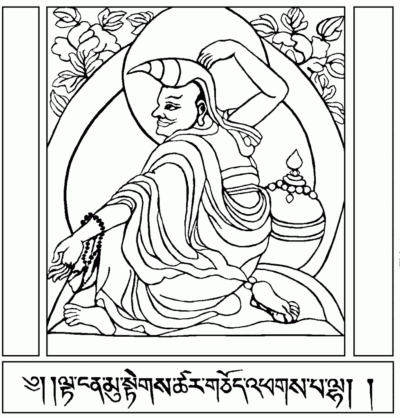 1 – Aryadeva: Four Hundred Verse Treatise on the Actions of a Bodhisattva’s Yoga
1 – Aryadeva: Four Hundred Verse Treatise on the Actions of a Bodhisattva’s Yoga
Aryadeva: People receive suffering from their very bodies, but happiness from other (external sources). Why are you so devoted to your body, which acts as a container for all your sufferings?
1 – Aryadeva: Four Hundred Verse Treatise on the Actions of a Bodhisattva’s Yoga
(Byang-chub sems-dpa’i rnal-‘byor spyod-pa bzhi-brgya-pa’i bstan-bcos kyi tshig-le’ur byas-pa, Skt. Bodhisattva-yogacarya-catu:shataka-shastra-karika) by Aryadeva translated by Alexander Berzin, 1978 according to the commentary of Gyeltsabjey (rGyal-tshab rJe Dar-ma rin-chen)
I prostrate to the Arya Manjushri.
One: Indicating Methods for Ridding Yourself of Grasping (at the Body as) Permanent
(1) As the master over the three planes of perishable existence,
The Lord of Death, by self-nature, is without a creator,
What could be more improper than to fall asleep
While the real situation is that he will definitely come.
(2) Having been born for the sake of coming to die
And, under the power of other (things), having the situation
of going (ever closer to your end),
It would appear as though you were going to die,
Not as though you were going to live.
(3) You may see as short your time already spent,
And the future as otherwise,
But (whether) you think of these as equal or unequal,
It would seem as though you should cry out in fear at the obvious.
(4) If death is not fearsome to you because it is something general,
Shared with all others as well,
Does it make you suffer with jealousy
When it ravages someone (else)? Continue reading »

 1 – Aryadeva: Four Hundred Verse Treatise on the Actions of a Bodhisattva’s Yoga
1 – Aryadeva: Four Hundred Verse Treatise on the Actions of a Bodhisattva’s Yoga
 3 – Aryadeva: Four Hundred Verse Treatise on the Actions of a Bodhisattva’s Yoga
3 – Aryadeva: Four Hundred Verse Treatise on the Actions of a Bodhisattva’s Yoga


